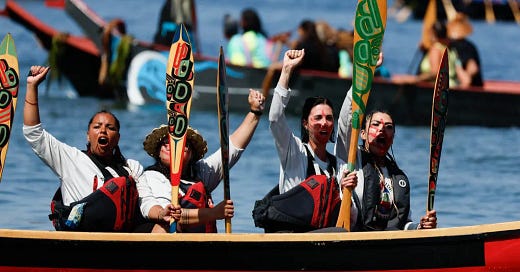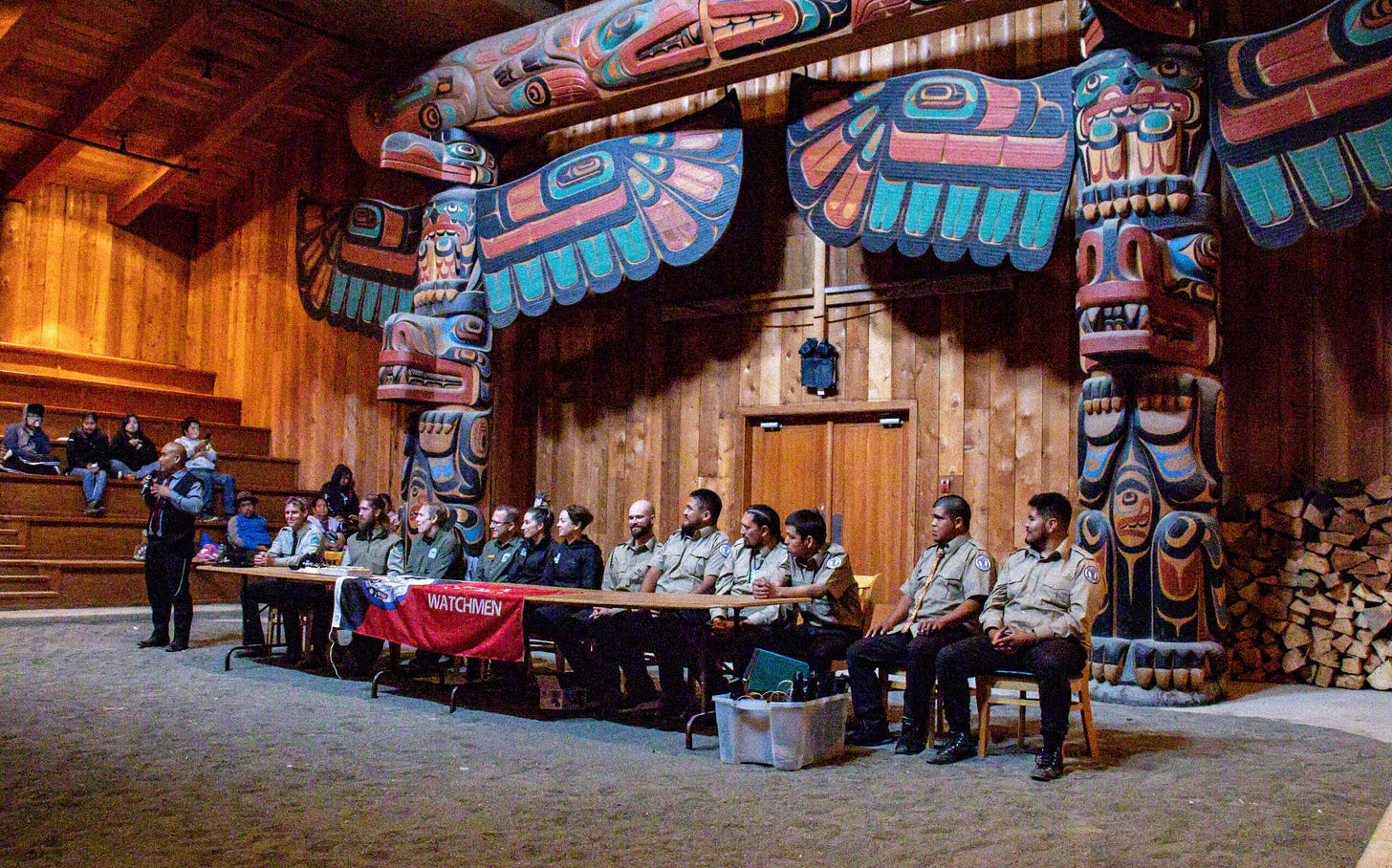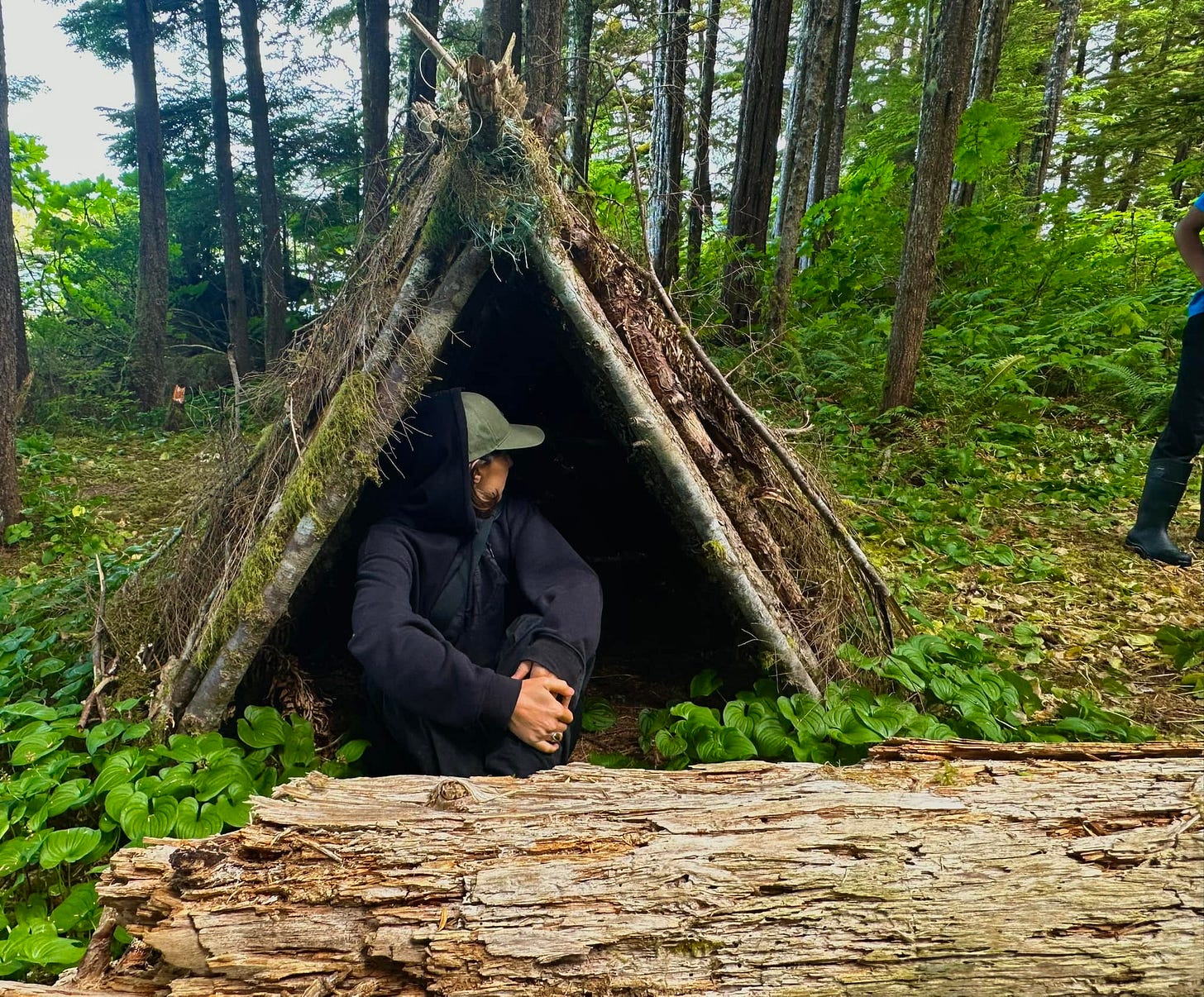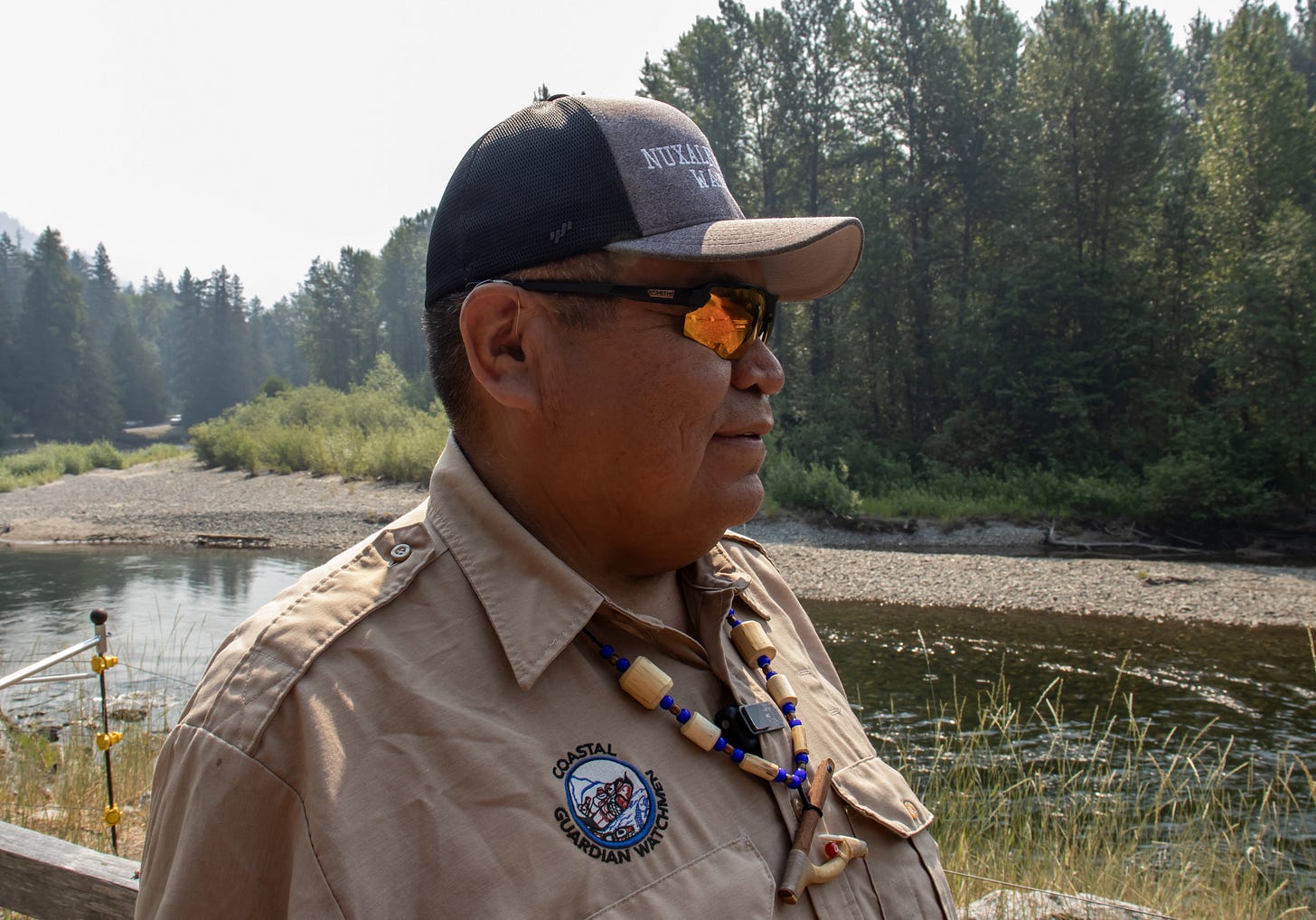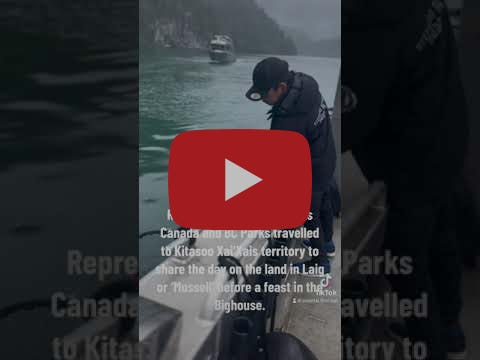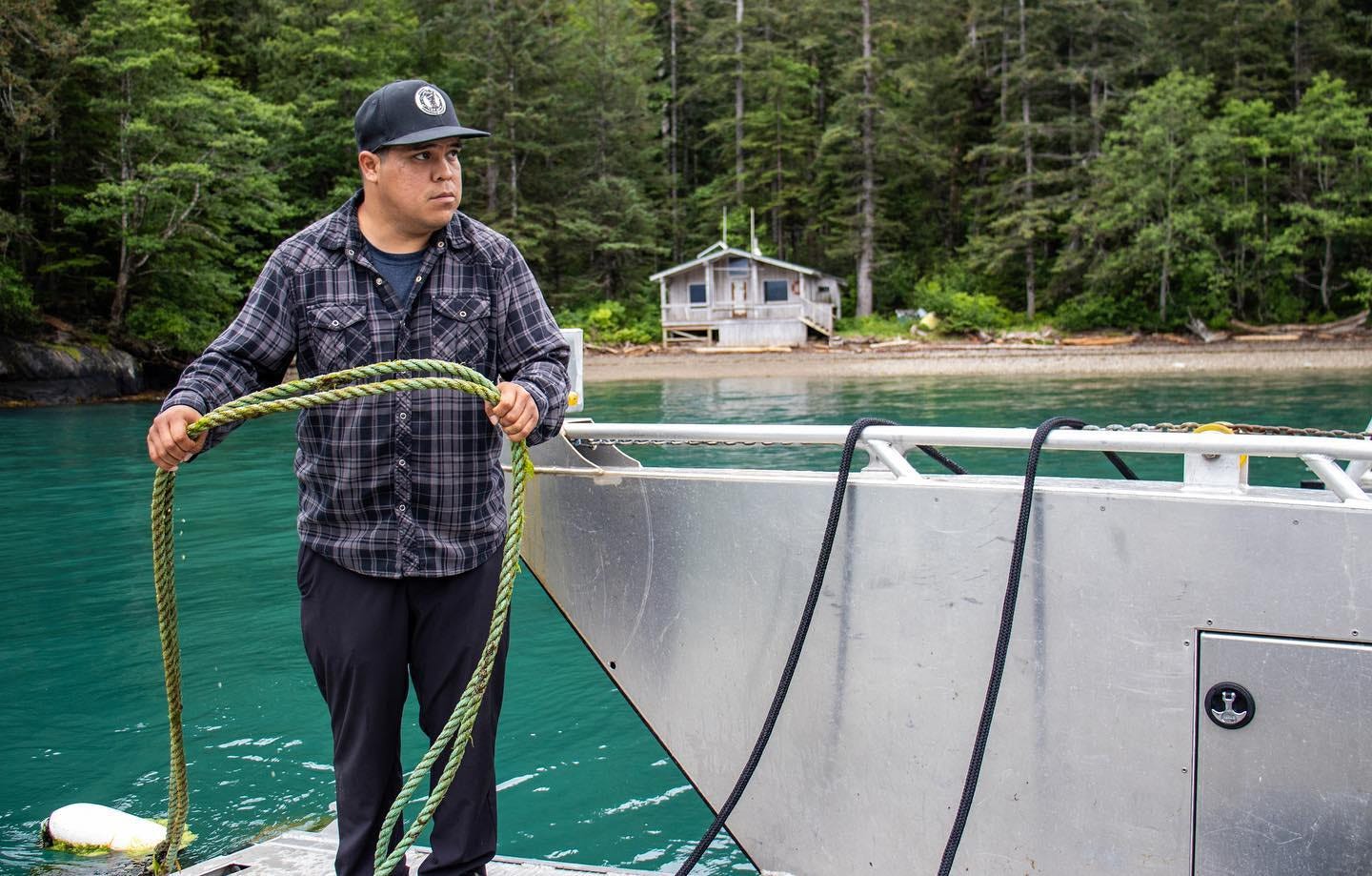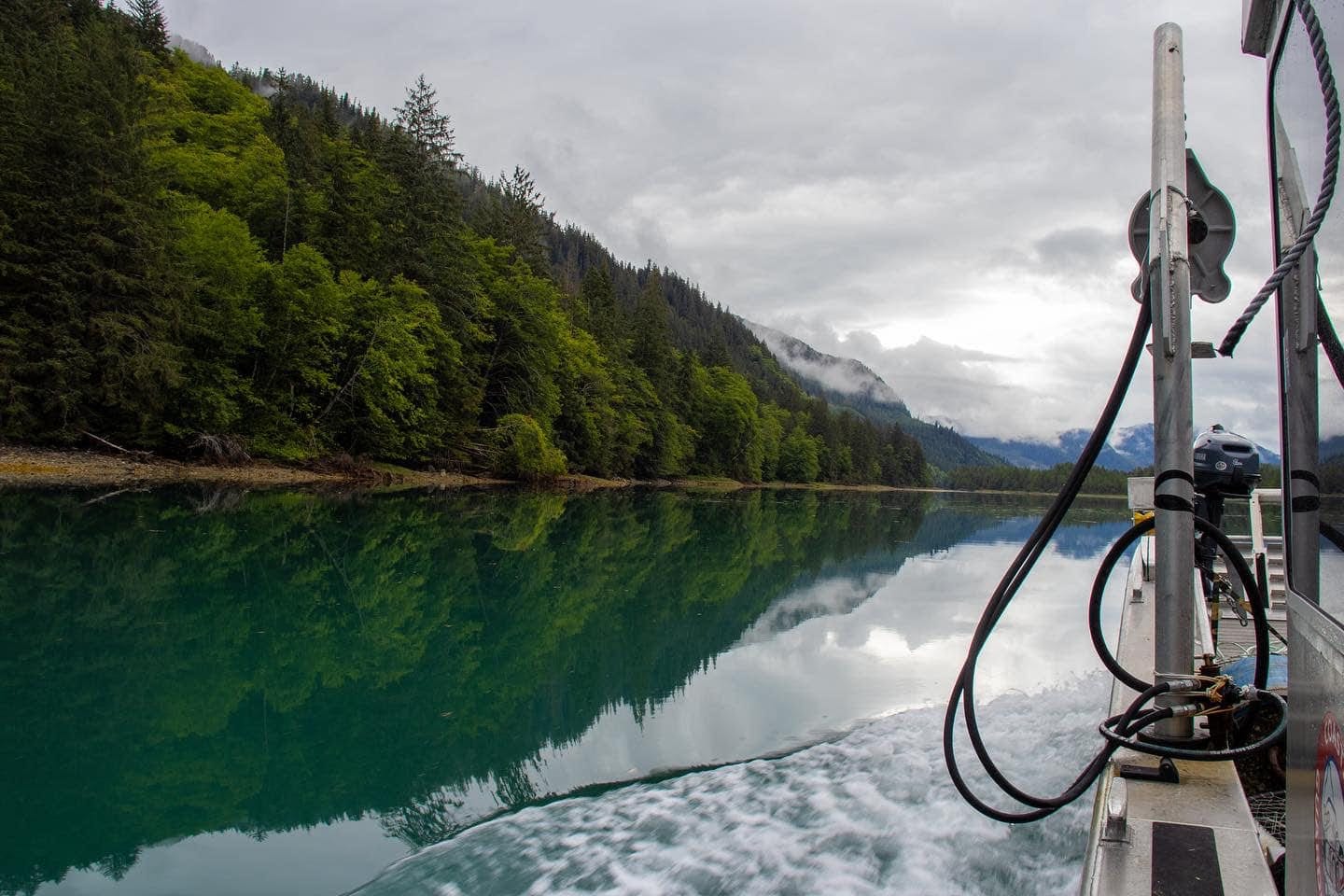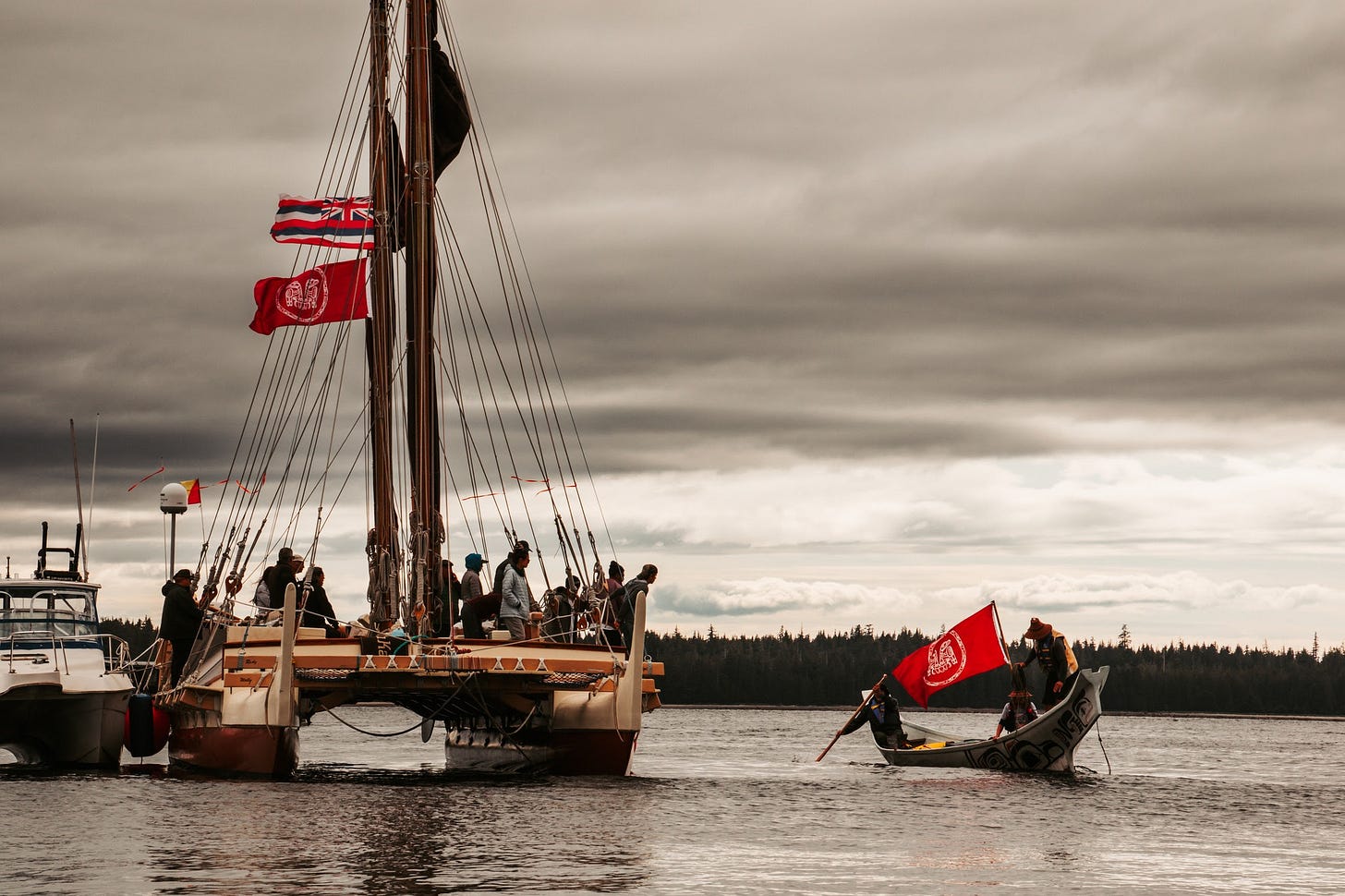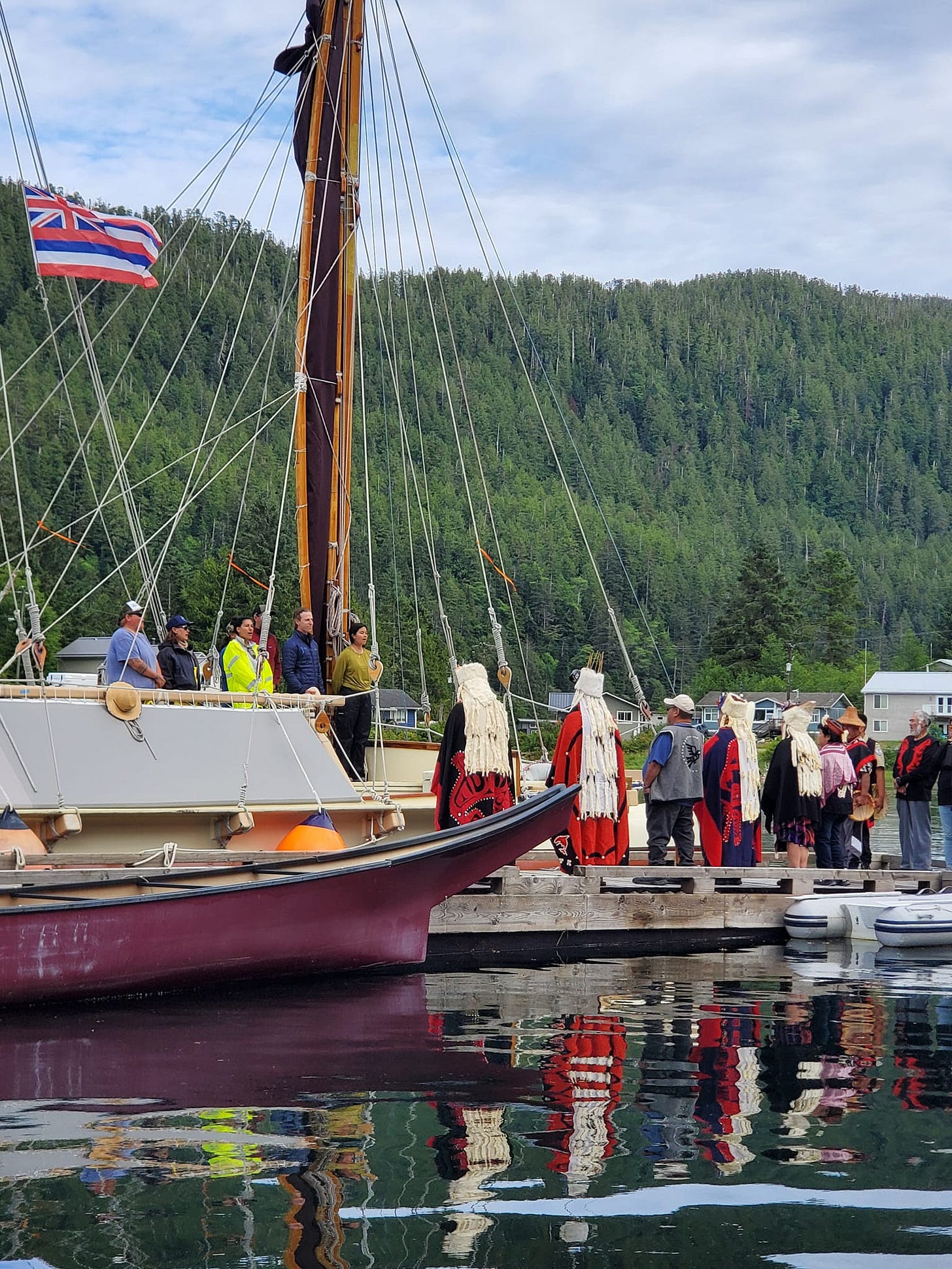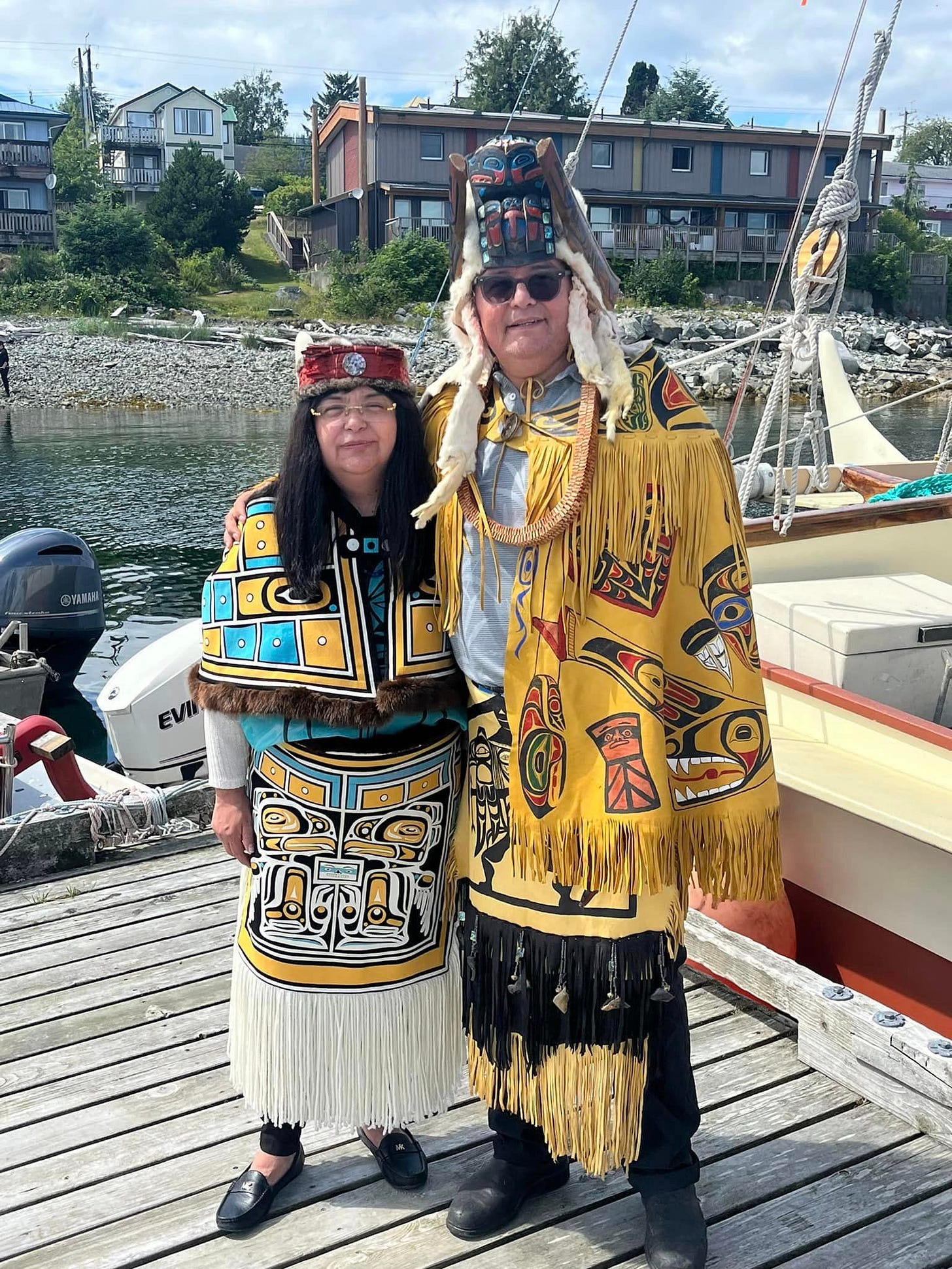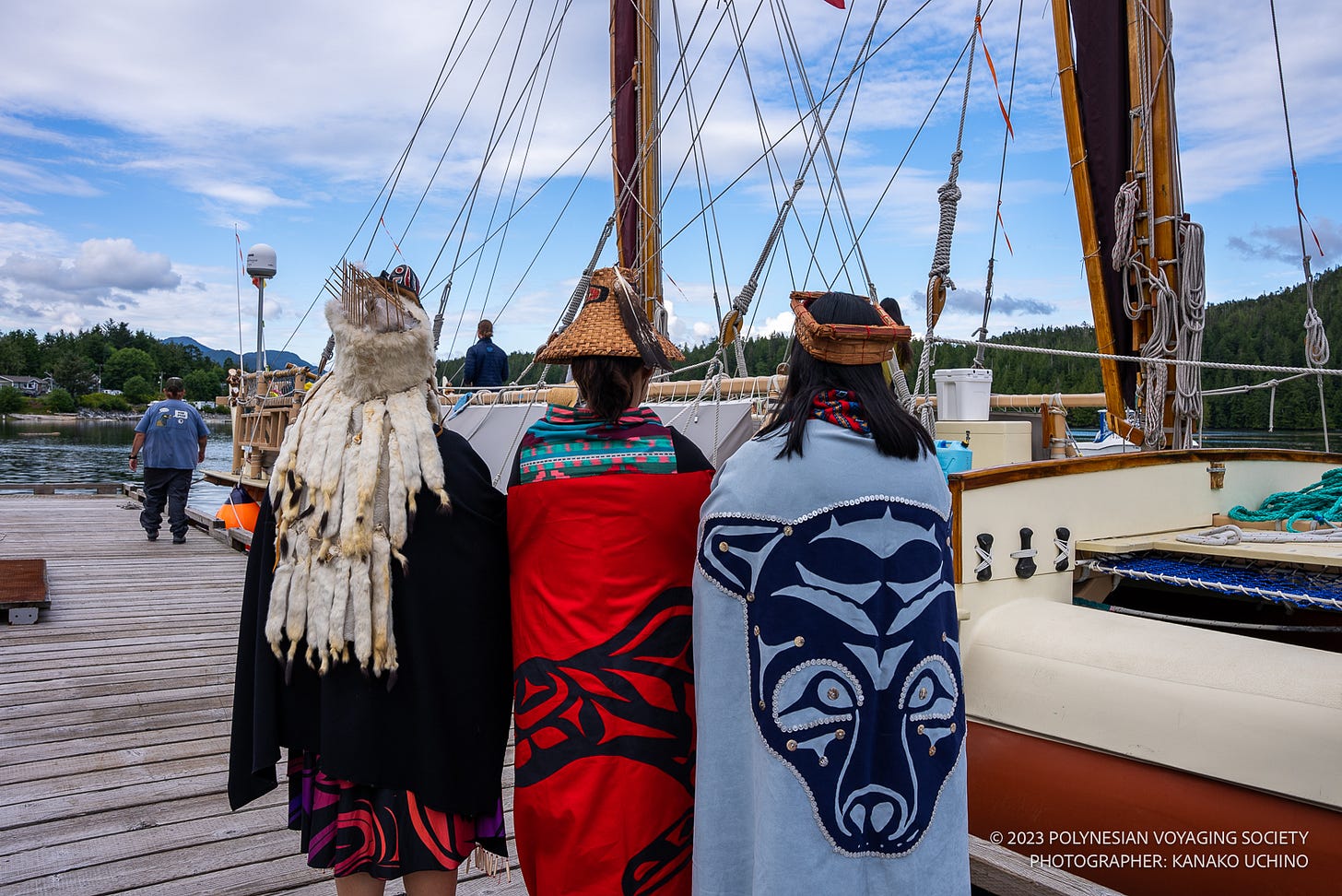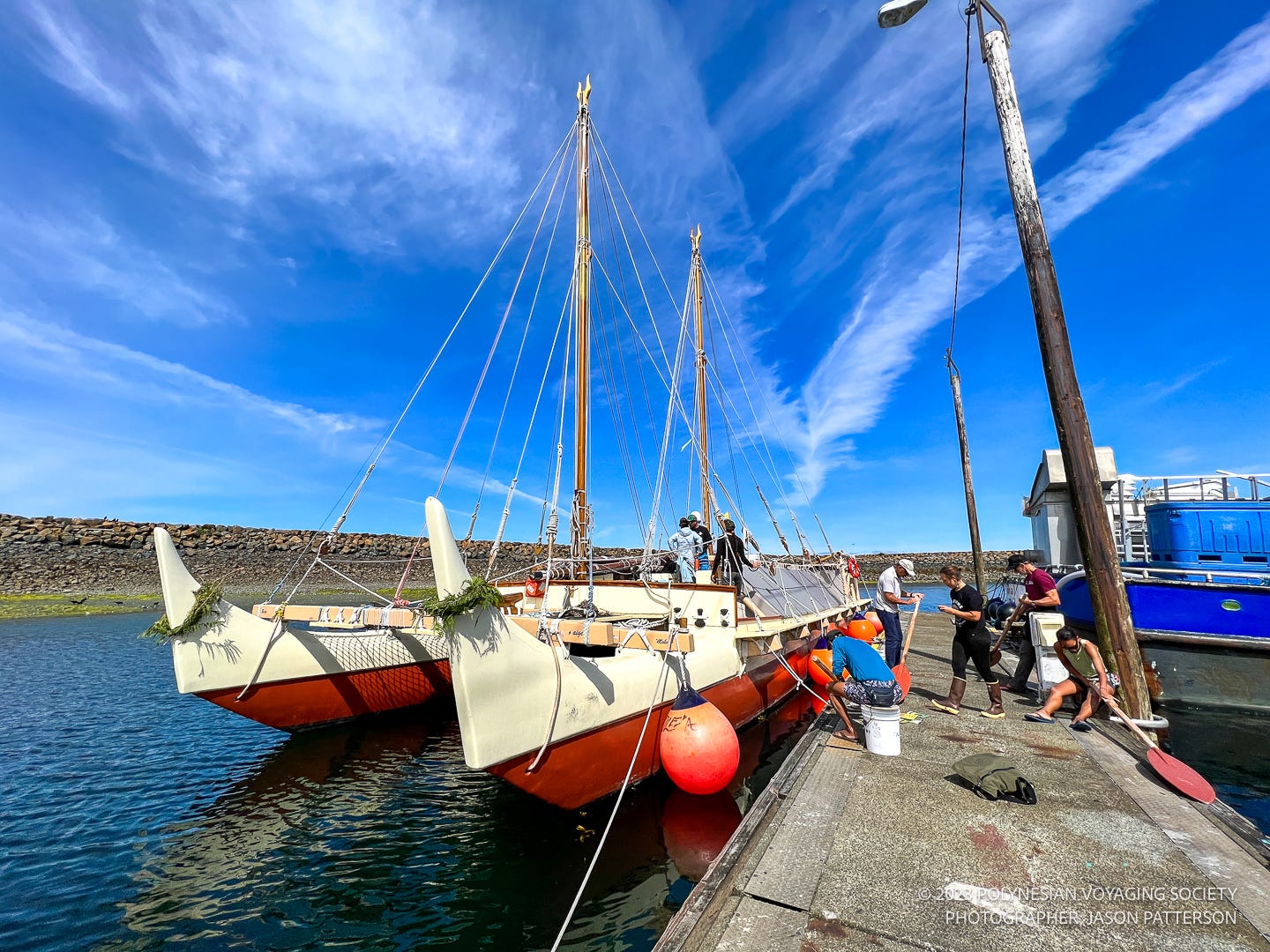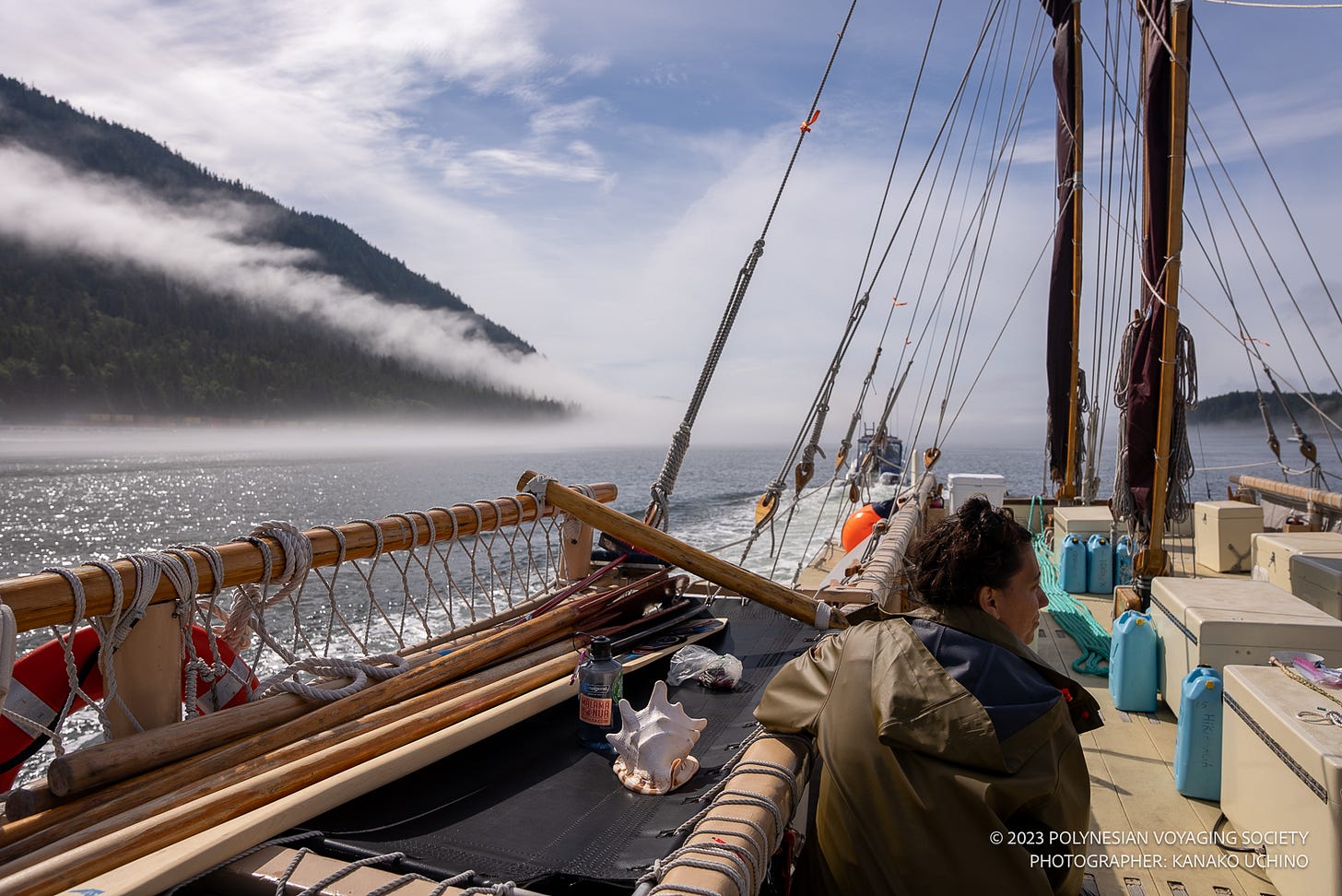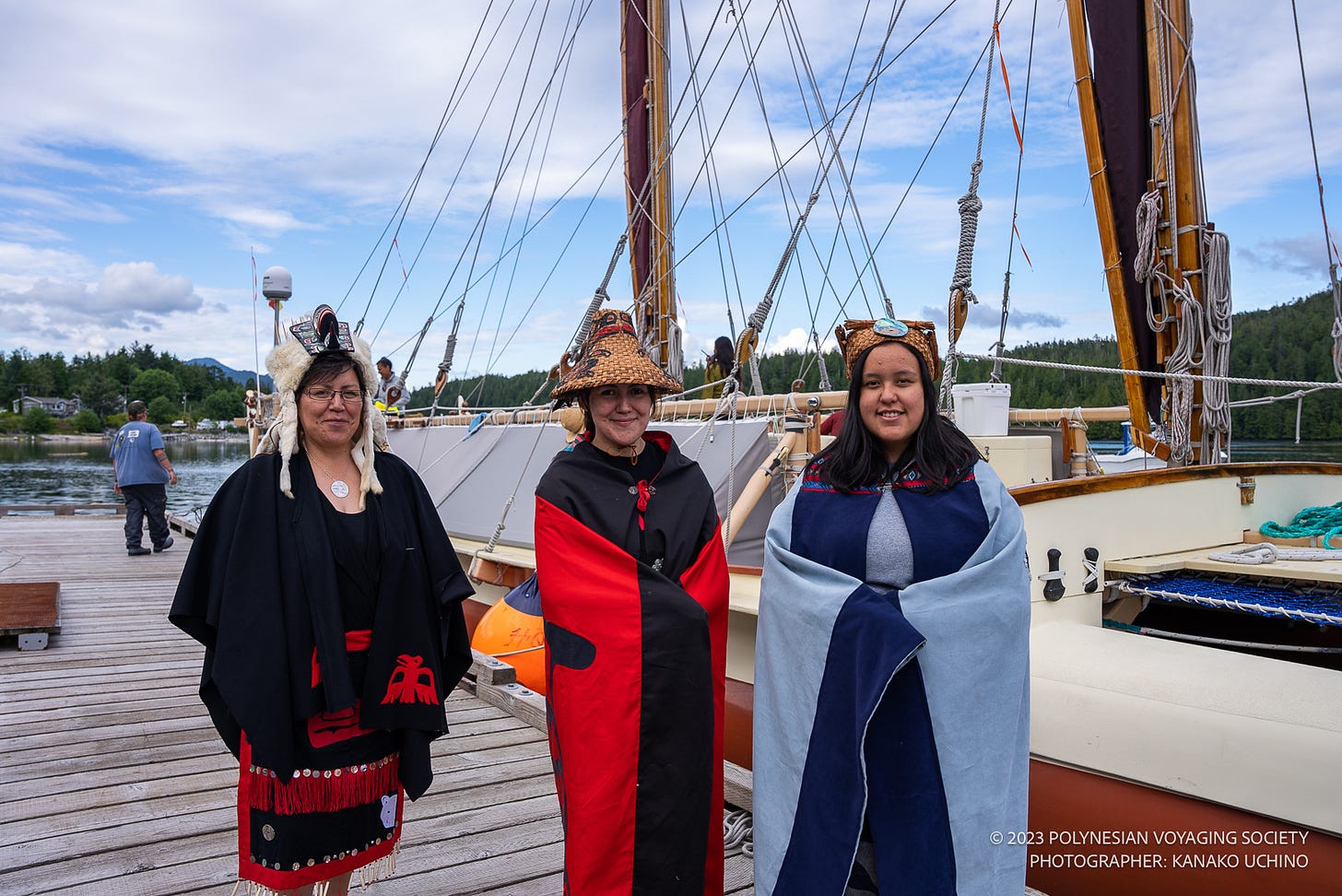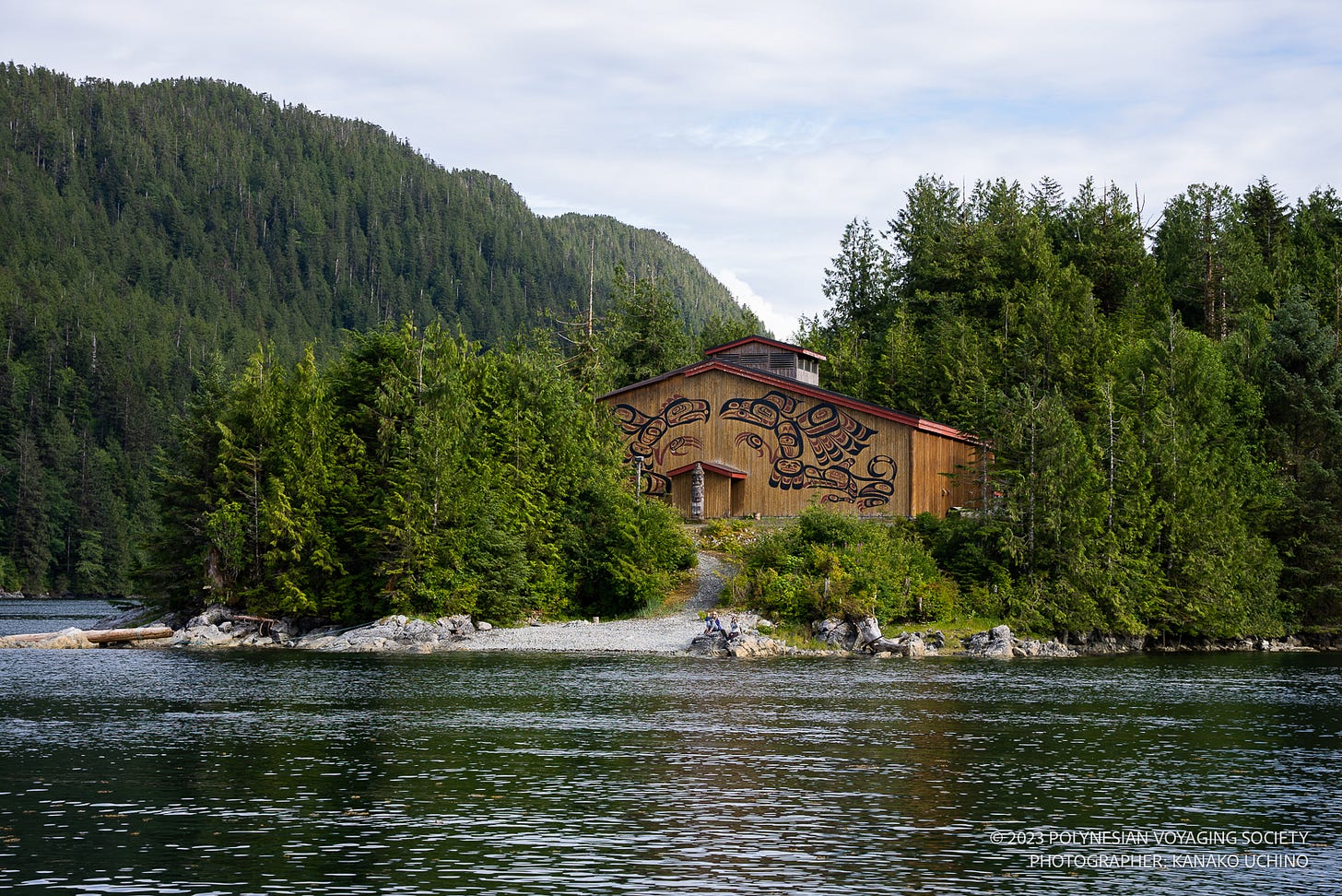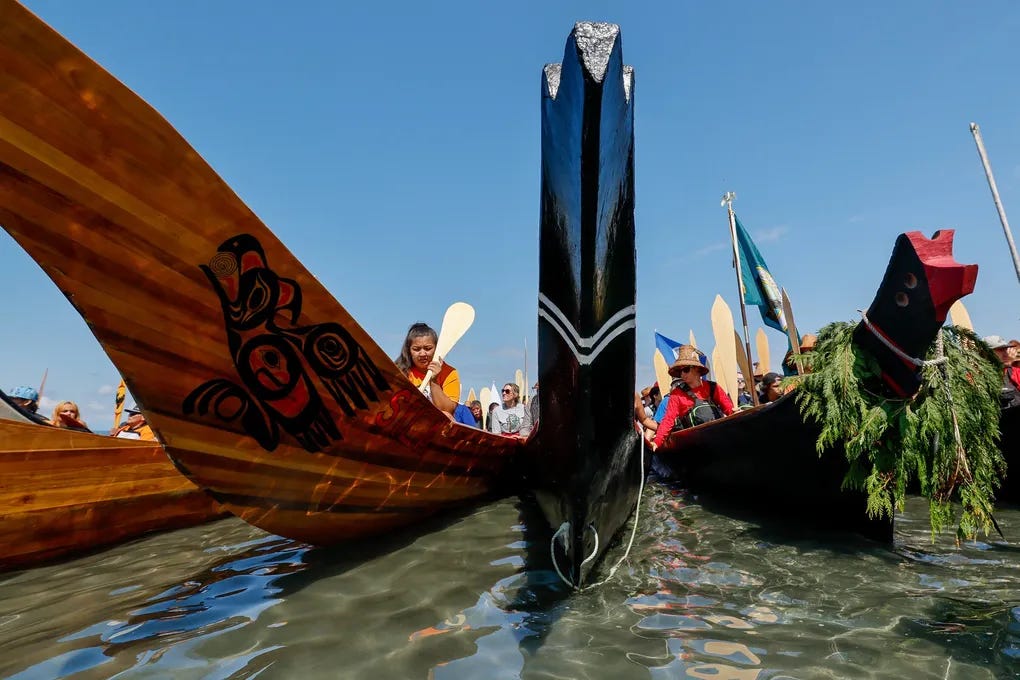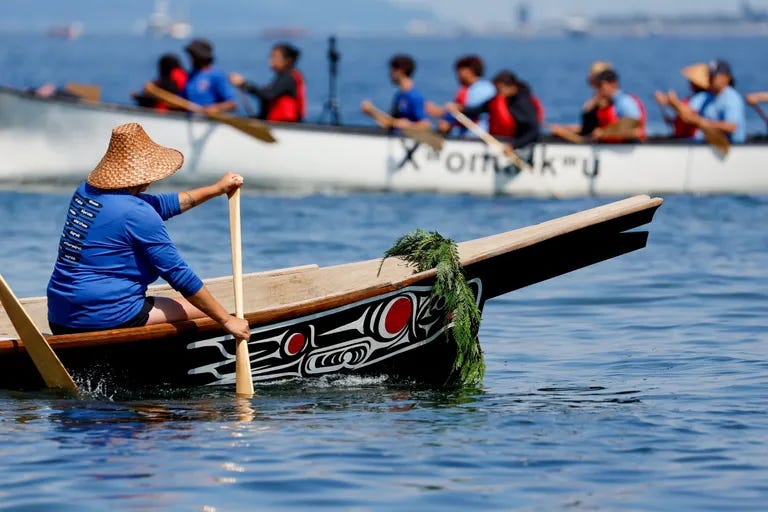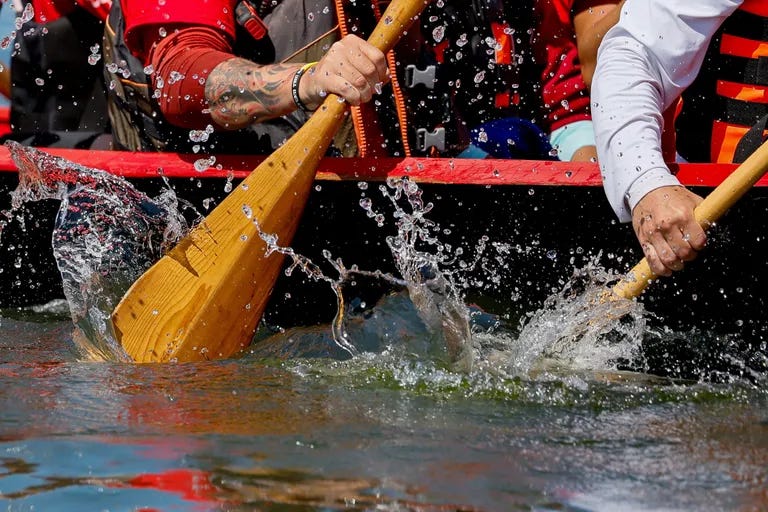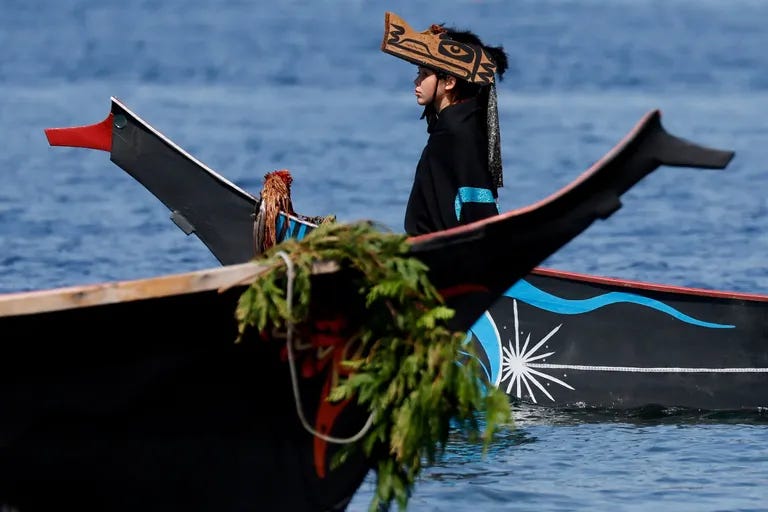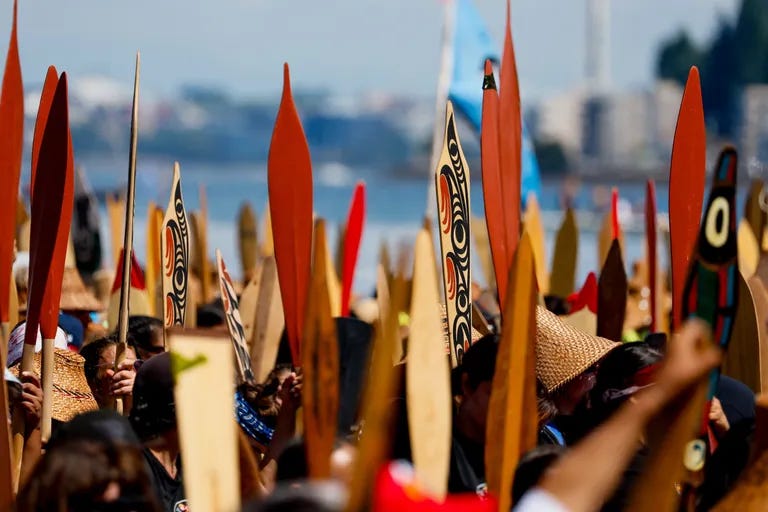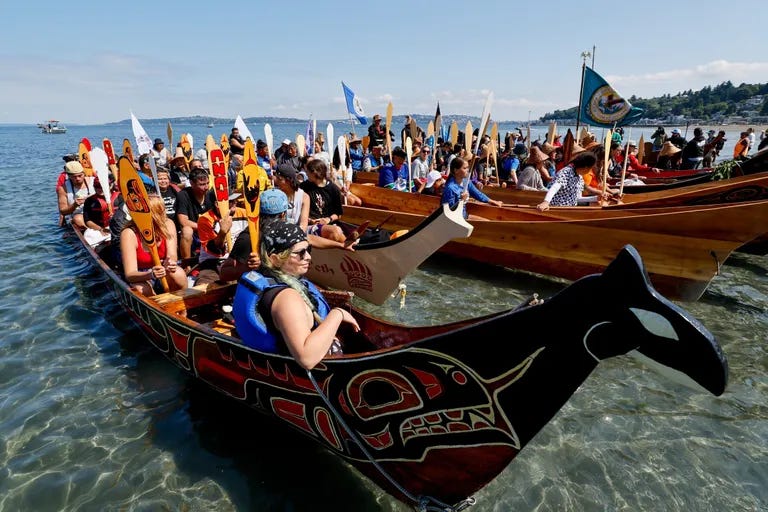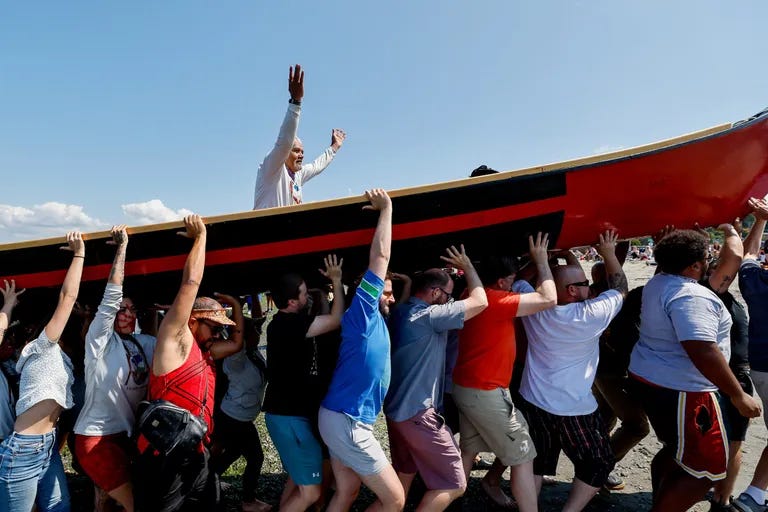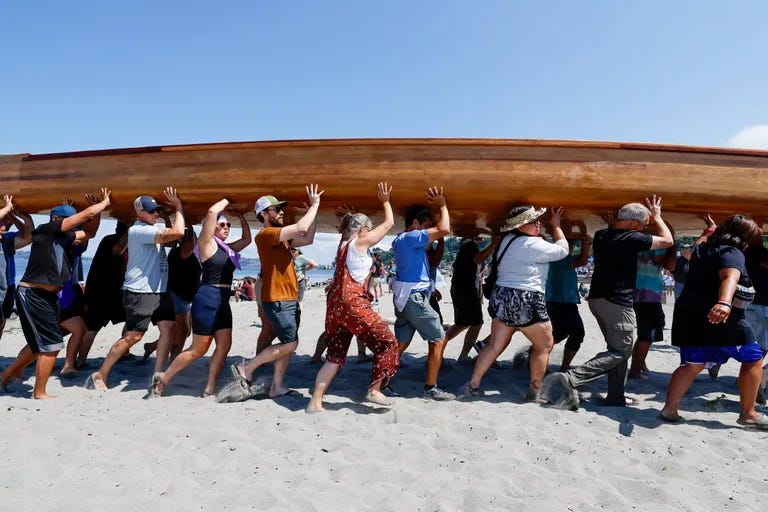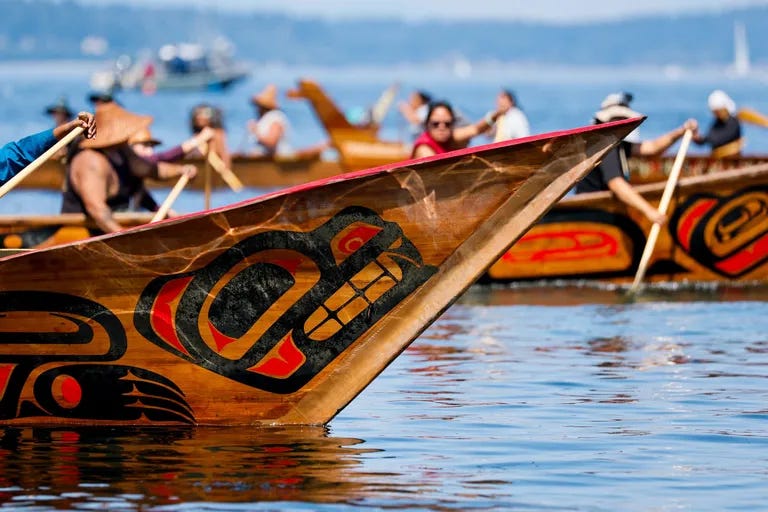‘A Voyage for Earth’ cultural ocean journey 🌎 🐬
NW Tribes & Hawaiian Hōkūleʻa canoe journeys unite Pacific First Nations
NW Tribes & Hawaiian Hōkūleʻa canoe journeys unite Pacific First Nations
Stories From the Coast
Update: August 2023
It was an honour to witness two badge ceremonies — one with the Kitasoo Xai'Xais Nation and the other with the Nuxalk Nation — as Guardian Watchmen received park ranger badges and legal powers, after decades of work. Kitasoo Xai'Xais Chief Councillor Doug Neasloss called the moment "historic," saying "if there's an example of reconciliation, this is it." Read more about what it took for this unprecedented project to happen and what it means to the Guardians at the link below.
The Coast has been a living breathing moving entity over the past months — with pacific canoe voyage greetings, potlatches, minister visits, people in their ancestral places making big moves for future generations. We're on the ground, witnessing, listening, learning how to TikTok to reach the youth, sharing stories from the coast. Thanks for being on this special journey with us,
Emilee Gilpin
Senior Communications Advisor and Community Storyteller | Coastal First Nations-Great Bear Initiative
HIGHLIGHTED STORIES
Guardians Receive Park Ranger Badges — ‘A Modern Link to Ancestral Responsibilities’
Guardians from two Coastal First Nations, the Kitasoo Xai’Xais Nation and the Nuxalk Nation, received park ranger badges and associated legal powers from BC Parks last week. The achievement — a power-sharing agreement born from decades of hard work, relationship-building and training — is the first-of-its-kind in B.C. and Canada.
Check out our on-the-ground videos on TikTok, Instagram and Facebook.
Kitasoo Xai'Xais Guardian Spencer Mason's paternal great grandfather came from Kynoch. Mason grew up with his dad’s father from a young age.
“My dad’s dad was from Klemtu, lived in the Kitasoo area. His wife was from Haida Gwaii. I grew up hearing stories about where they camped and fished. They would camp six months of the year, come back with what they got,” Mason says. “My grandfather used to work in a logging camp, until he couldn’t work anymore. One day, he called me and said, ‘one day you’re going to be looking after this, it’s going to be up to you guys now.’”
Mason says it took him a few years to understand his grandfather’s words.
“There was a lot of illegal activity at the time. He didn’t know the Watchmen Program would start up… he was doing this 30/40 years ago, protecting it for us, fishing areas, bears, the land, he told me a lot of stories… I think he would be really happy to see what’s happening now, what he left behind… that we’re working to make sure everything is left.”
IN OTHER NEWS
‘Moananuiākea: A Voyage for Earth’
journey has been connecting with Pacific communities across the Coast, amplifying the importance of Indigenous cultures and ocean knowledge. Moananuiākea is Hōkūleʻa’s 15th major voyage in her first 50 years. “At the core of her creation was exploration — to uncover, recover and reclaim.” Track the voyage at https://hokulea.com/moananuiakea/.
Photos by Destiny Davidson
Hawaiians arrive in Kitasoo Xai'Xais Territory. Photo by Spencer Mason
Heiltsuk Chief Councillor K̓áwáziɫ Marilyn Slett and Hereditary Chief λáλíyasila Frank Brown/Heiltsuk Chiefs and Elders welcome the Polynesian Voyaging Society. Photo from CFN-GBI President Chief K̓áwáziɫ Marilyn Slett
Connect with us
If you have any stories, news or community-relevant information you'd like to see CFN share on our platforms or shared in our newsletter, please don't hesitate to reach out. Email pitches, ideas, stories to egilpin@coastalfirstnations and be sure to follow us on Facebook, Twitter and Instagram at the links below.
Hōkūleʻa Makes Four More Stops in British Columbia
PVS Hawaii Moananuiākea Voyage
Since departing Prince Rupert last week, Hōkūleʻa and her crew have been sailing and making stops in British Columbia including Hartley Bay, Klemtu, Bella Bella and now Hakai where the canoe arrived yesterday at 6:45 p.m. The crew has been learning about the people and values of each of these places, making strong, rich connections despite the short stays. The voyagers are also learning how to sail through new waters and in weather very different from Hawaiʻi.
On July 20, departure from Prince Rupert for Hartley Bay was delayed by a few hours due to dense fog. Once the crew observed the weather clearing, they departed at approximately 10 am and entered the Grenville Channel paying close attention to floating obstacles in the water, especially as the fog continued to limit their visibility. As the morning progressed, the sun began to shine through, dissipating the fog and making British Columbia’s lush green coastline and turquoise blue water visible again. The gusting wind added to the wide range of weather and ocean elements throughout their nearly 12-hour transit. At approximately 9:30pm, Hōkūleʻa arrived at Hartley Bay where the crew was greeted by a small group of members from the Gitga’at community, population about 125, eager to welcome them to their lands.
“The success and smoothness of our journey to Hartley Bay is proof that one of the most important decisions that can be made related to voyaging is whether the time is right to go; based on history, experience, and naʻau,” said apprentice navigator Lucy Lee.
The crew spent two days in Hartley Bay where they were hosted by the community and spent time exchanging stories and dances with elders and “elders in training.” The crew also hosted tours of Hōkūleʻa.
On July 23, the canoe departed Hartley Bay for Klemtu, sailing through in weather ranging from heavy squalls, cold rain and lightning to bright sunshine. The constant change in weather has allowed the crew to strengthen their skills in managing the tow line when necessary, handling the steering sweep, and helping each other and the waʻa (canoe). They also saw what looked like small orcas but were in fact Dallʻs porpoises, endemic to the North Pacific and said to be the largest of porpoises.
As the canoe was about 20 miles from their destination, community boats came out to guide them and keep them company for the remainder of their trip into Klemtu. “As the Klemtu boats appeared, so did the sunshine. Those on the vessels were dressed in their regalia and their smiles were warm and wide,” said Lee. Once Hōkūleʻa arrived in port at Klemtu, the crew was greeted by the community of the Kitasoo/Xai’xais territory with drumming and songs then hosted to a dinner where they exchanged meaningful stories. “While our stay in Klemtu was short, it was an evening that filled each of our ʻumeke and allowed us to have a moment of silence with each other and ourselves as we continue through this huakaʻi,” said Lee.
Just one day later, on July 24, Hōkūleʻa and crew departed Klemtu for Bella Bella. This transit proved a good lesson in planning as it required about 13 miles of sailing through an area exposed to the open ocean, rather than the protected inland passage. Timing is indeed everything as the crew reported smooth sailing, as they arrived several hours later in the Heiltsuk village on the east coast of Campbell Island, B.C.
In Bella Bella, population approx. 1,100, though rainy much of the time, the crew received a warm welcome in the Big House, which opened in 2019 and was this communityʻs first Big House in 120 years, after the government banned them as well as potlatches (a traditional ceremonial feast) that were held in them. That ban was lifted in 1951, but it took decades to raise funds and more than a year to build with local cedar logs. The crew felt fortunate to be able to experience the Heiltsuk hospitality, song, dance and wisdom in this special gathering place.
Yesterday, July 26, canoe and crew departed Bella Bella and sailed 30 miles south to Hakai, on the northwest end of Calvert Island, B.C., a place known for its stunning natural beauty. It is a hot bed of ocean science and innovation, and much of that is thanks to the Hakai Institute, which welcomed Hōkūleʻa to its dock. Though a short stay of one or two days, the crew looks forward to exploring this area and learning from the scientists and researchers doing important work for this area and ultimately for our island earth.
Hōkūleʻaʻs next leg to Port Hardy will again require sailing in waters exposed to the open ocean, but for a longer period, so departure must be well-timed in consideration of weather, currents, tides, winds and waves. Depending on those conditions, the canoe and crew may depart tomorrow, July 28.
Hōkūleʻa Sails Along Great Bear Rainforest
By PVS Hawaii Moananuiākea Voyage
On this leg of the Moananuiākea Voyage, Hōkūleʻa and her crew have been sailing along and learning about British Columbia’s Great Bear Rainforest.
The Great Bear Rainforest encompasses 6.4 million hectares of coastal temperate rainforest, protected in partnership by the government of British Columbia, corporations, environmental groups, and the 26 First Nations who have lived in this region for more than 14,000 years. By law, 85% of the forest is protected from logging, including 70% of old growth forest, but the agreement still allows for economic benefits to local communities, especially First Nations. These restrictions protect native flora, fauna, and the many gifts that they provide, such as water filtration. Several marine protection plans have also been implemented adjacent to the rainforest.
“This region and its communities exhibit tremendous beauty and generosity, and our crew is grateful to grow our relationships with them throughout our voyage,” said crewmember Kaleohano Farrant.
Paddle to Muckleshoot
Honoring our Warriors Past and Present
After four years, First Nations canoes unite in Salish Sea journey once more
TULALIP SUPPORT BOAT, Salish Sea — Cheers erupted from canoes Big Brother and Big Sister as Shawn Edge plunged into the 60-degree waters early Sunday morning. He was paying his dues for mistakenly calling one of the canoes a boat.
The Tulalip Tribes’ canoe family were on their way to Muckleshoot lands, the last leg of a more than 100-mile journey through their ancestral highways to the sandy shores of Alki Beach.
A sea of people waited on the shores Sunday afternoon to welcome about a hundred canoes to Muckleshoot. The canoe families traveled from villages spanning Warm Springs, Ore., to Alaska, converging at stops along the shores of the outer coast and Salish Sea to share community, songs, meals and stories. It was the first journey since 2019 — since the pandemic began — and for many, a needed return to the water.
“Once we get on the water, that’s where I feel most joy,” Monie Ordonia, a Tulalip elder, said while taking a break on the tribes’ support boat. “I’m the elder puller, and it feels so good to be with these younger generations, seeing them carry on our culture.”
Running on nothing more than a few hours of sleep and the relaxing cadence of skipper Andrew Gobin’s voice kicking off songs, Tulalip people quickly pulled Big Sister and Big Brother from the shores of Suquamish where they’d spent a day resting.
More than 30 canoe families had signed up to share song, dance and stories in Suquamish’s House of Awakened Culture on the shores of Port Madison Bay on Saturday. About 10 hours in, the thrum of Quinault Nation’s drumbeats and voices carried across the Salish Sea as the sun faded and moonlight illuminated more than 90 canoes lining the grass. Dads danced with their daughters just outside the doors. Kids warmed their hands over a crackling fire pit.
Hundreds of tents filled Suquamish land, near wayfinders for the grave of Chief Seattle, siʔaɬ, a Duwamish and Suquamish leader and the namesake for canoe families’ upcoming destination across the water.
“There’s songs and stories and place names that are associated with the ancient landscape here. It’s important to maintain those and keep those going, for our cultural, spiritual and mental health and also for tribal sovereignty,” said Suquamish Chair Leonard Forsman, who was on the tribe’s docked support boat.
Return to Seattle
Descendants of signatories to the Treaty of Point Elliott were among those who organized the first Paddle to Seattle to Alki Beach in 1989, resurrecting a centuries-old tradition of navigating the region’s waters by canoe. Emmett Oliver, a survivor of a federal Native American boarding school in Tulalip, was credited with its creation.
For decades since, dozens of canoe families from the outer coast and Salish Sea have converged at various villages along the shores each summer.
It was Oliver’s dream to see 100 canoes from nations up and down the region land together on the shores, his daughter Marylin Bard said at a ceremony in Suquamish on Saturday.
On Sunday, that dream was realized, as about a hundred canoes, pulled by hundreds of people, carved through rolling waves on their way to Alki.
“It’s always good to get into that atmosphere of seeing the sun rise as you’re pulling out of the village, seeing the landscape and being near the water,” Forsman said. “Just traveling in that way — it’s hard to describe. It’s the old way of traveling. It brings you back to that center, you and the water together.”
A canoe full of Swinomish youth yelled out to Tulalip’s canoes, jokingly offering a head start as they paused to rest. They soon sped ahead of the other canoes.
People piloting support boats — fishing boats, tribal police boats, leisure craft equipped with snacks, sometimes bathrooms and other necessities for canoe pullers — called out words of encouragement, and often poked fun at those slowing down as their arms grew fatigued.
Skippers, the people at the back of the canoes in charge of monitoring the tides, keeping the canoe family motivated and safe, often started chants or songs to keep the paddles in sync.
“You need to make sure they’re not looking like a caterpillar,” joked Douglas James, who is Quinault and a skipper for the Song Birds Canoe Family.
As the Tulalip canoes pulled up to Alki on Sunday afternoon, Natosha Gobin, a Lushootseed language teacher, introduced the crew to Muckleshoot leaders and asked permission to come ashore in her native language as dozens of canoes had before their arrival.
“We are Sduhubš,” Gobin said. “We traveled here together on gifts from our ancestors.”
As they had for dozens of canoes earlier in the day, the Muckleshoot leaders welcomed them.
For future generations
Many people remember their first canoe journey. For some, it was fighting massive swells for 12 or more hours while trying to get up the coast and into the Strait of Juan de Fuca. For others, it was the closeness they felt with relatives from near and far, and the closeness they felt with their culture and ancestors.
Being back on the water after four years, for many, was a reminder of past journeys, and the need for more to come.
For Muckleshoot Vice Chair Donny Stevenson, that first journey a decade ago to Quinault helped him find himself.
“That was a point in my life where I started to worry about things like legacy, and whether you were making your family and your ancestors proud and how I represented that,” he said at Alki on Sunday. “That connection when you’re on the water is something that is tangible, it’s real. I don’t have to think about whether my ancestors were traveling with me, I felt that in the core of who I am.”
There were generations who were legally barred from sharing their songs, dances and prayers, in an era of federally mandated assimilation. Now, generations are carrying forth these traditions through canoe culture, through the journey. For some, that tradition started this year. Others have been practicing it for decades.
Luschiim Charlie, an 81-year-old Cowichan elder, has been out on the water since he was 3 years old.
He sat outside the Suquamish House of Awakened Culture next to his granddaughter Bella as his daughter Sonya Charlie pulled Bella’s hair into tight, neat braids Saturday morning. Sonya Charlie said she’d learned to braid when she was around Bella’s age, dancing powwow.
Luschiim Charlie pondered how it felt to be joined by his kids and grandkids, some on their first journey, out on the water.
“It brings tears to my eyes, from joy and happiness,” Luschiim Charlie said as Bella wrapped her arms around him. “The things they do reminds me of the things I used to do.”
~ Isabella Breda https://archive.is/6ILSF
Canoe Journey 2023 Paddle to Muckleshoot at https://muckleshootcanoejourney.com/
This summer, Indigenous Tribes from the Northwest and beyond will paddle ancestral Salish Sea waterways as they have since time immemorial for a weeklong celebration of heritage and culture hosted by the Muckleshoot Tribe.
The theme of #CanoeJourney2023 is "Honoring Our Warriors Past and Present." Come join us for Paddle to Muckleshoot.
❤ ♥ ❥ ⛈
If you appreciated this newsletter, pass it along, follow, recommend. Subscribe & support to keep vital connections & information going, giving leverage to our causes & sources. Without your support we remain in a dusty bottom drawer of the internet. ♞❣♘

